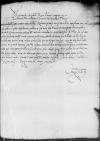List #901
Sigismund I Jagiellon do Ioannes DANTISCUSCracow (Kraków), 1533-02-24
| odebrano [1533]-03-03 Rękopiśmienne podstawy źródłowe:
| ||||
Tekst + aparat krytyczny + komentarz Zwykły tekst Tekst + komentarz Tekst + aparat krytyczny
Reverendo in Christo Patri, domino
R hidden by binding⌈[R]R hidden by binding⌉everende in Christo Pater, sincere nobis dilecte.
Relatum est nobis non solum adhuc non solutas esse, sed ne solui quidem inceptas contributiones publicas in istis
Quae bene valeat.
Dat(ae) or Dat(um)⌈Dat(ae)Dat(ae) or Dat(um)⌉
Commissio propria regiae maiestatis.


 BCz, 1601, p. 314
BCz, 1601, p. 314